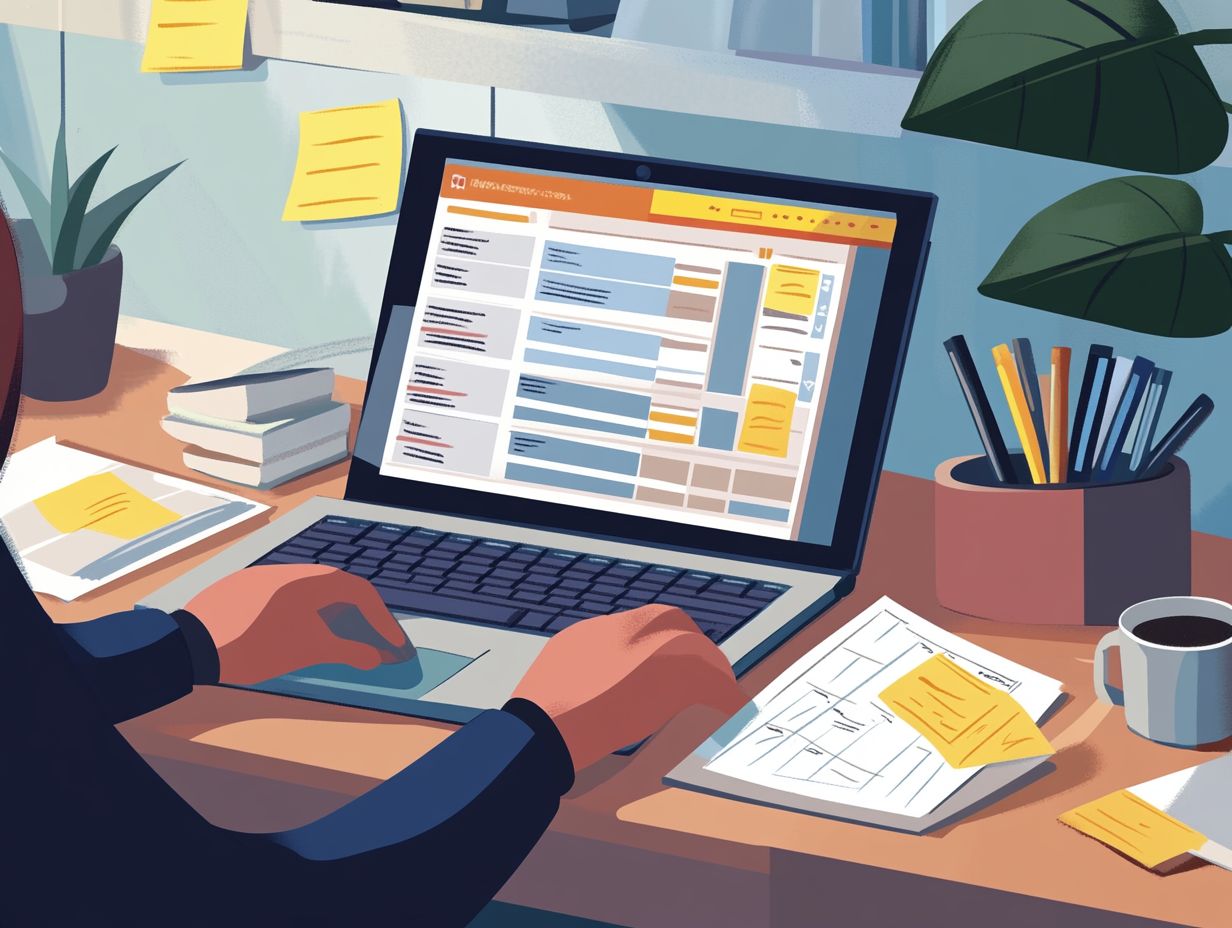Understanding the PMP Certification Process
PMP (Project Management Professional) Certification is a respected credential that can elevate your career in project management.
This certification provides numerous benefits such as higher salary potential and more career opportunities. It includes eligibility requirements, exam format, and crucial tips for preparation and maintaining certification.
Whether you’re starting in project management or looking to advance your career, this guide equips you with insights to navigate the PMP journey confidently.
Contents
Key Takeaways:

PMP certification can open doors for career advancement and higher salary potential.
Eligibility requirements include a mix of education and project management experience.
Success in the PMP exam requires preparation and ongoing maintenance of certification through continuing education.
What is PMP Certification?
PMP Certification, offered by the Project Management Institute (PMI), is a globally recognized credential that validates your expertise in project management.
This certification shows your understanding of the PMBOK (Project Management Body of Knowledge) and your commitment to professional development in project management.
If you want to enhance your skills and advance your career in areas like healthcare, construction, or information technology (IT), PMP Certification is essential.
This certification establishes a framework that aligns with international standards, ensuring you have the skills to lead teams and manage projects effectively.
In a job market where skilled professionals are in high demand, being a certified project manager helps you stand out by demonstrating your ability to apply best practices outlined in the PMBOK. This not only fosters your growth but also improves organizational performance, making PMP Certification a valuable asset.
Benefits of PMP Certification
Obtaining PMP Certification offers significant advantages, including career advancement and the potential for a higher salary.
For project managers in various industries, this credential can serve as a powerful catalyst for professional growth and financial rewards.
Career Advancement and Salary Potential
One of the key benefits of earning PMP Certification is the increased salary potential and career advancement opportunities it unlocks.
Research from PMI shows that certified professionals can earn up to 20% more than their non-certified peers, making this certification a smart investment.
Companies value the high standards and skills that come with PMP Certification, often leading to quicker promotions and better leadership roles.
According to the PMI Talent Gap report, organizations prefer certified project managers, believing they have a better grasp of project management methods, risk management, and stakeholder engagement. This expertise helps projects succeed and supports organizational growth, putting you at the forefront of your field.
Eligibility Requirements for PMP Certification
To qualify for PMP Certification, you must meet specific educational and project management experience criteria.
This ensures only qualified individuals can sit for the PMP Exam. Take a moment to see if you qualify for this valuable certification!
Educational and Professional Experience Requirements

The educational and professional experience requirements for PMP Certification are vital. They ensure you possess the essential knowledge and skills to manage projects with confidence and competence, as detailed in understanding the value of PMP renewal requirements.
To qualify, you typically need a bachelor’s degree or its equivalent. This serves as a critical foundation for grasping complex project management concepts.
You ll also need to demonstrate substantial hours of project management experience about 4,500 hours with a degree, or 7,500 hours without one. This hands-on experience is invaluable, aligning with the Project Management Body of Knowledge (PMBOK) guidelines and equipping you with the tools to confront real-world project challenges.
Engaging in accepted training programs can significantly bolster your readiness for the PMP exam. These programs provide practical insights that connect theory with application.
This ultimately cultivates a deeper understanding of project dynamics and sets you up for success in your project management journey.
The PMP Exam
The PMP Exam serves as a rigorous assessment, carefully designed to evaluate your knowledge and understanding of project management principles, including insights on the value of PMP certification, as detailed in the PMBOK.
This examination is not merely a test; it is a testament to your expertise in navigating the complexities of project management.
Format and Content of the Exam
The PMP Exam comprises 180 questions designed to evaluate your understanding of project management knowledge areas as outlined in the PMBOK. This exam covers a wide array of topics essential for effective project management.
Each aspect of the assessment is carefully crafted to gauge your competencies across various domains, including:
- Initiating
- Planning
- Executing
- Monitoring and Controlling
- Closing
Within these domains, questions are distributed to reflect the importance of each area in real-world scenarios. This ensures you possess a comprehensive understanding of key methodologies and best practices.
Familiarity with the PMBOK content is invaluable, as it aligns closely with the exam structure. It mirrors the situations you will encounter as a project manager. To enhance your chances of success, focus on mastering processes, inputs, outputs, and tools within each knowledge area.
This approach underscores the importance of blending theoretical knowledge with practical application.
Preparing for the Exam
Effective preparation for the PMP Exam is a game changer for your career! It involves tapping into a variety of resources such as PMP Study Guides, PMP Question Banks, and possibly attending a PMP Boot Camp to ensure you have a thorough understanding of project management principles.
To maximize your readiness, start by crafting a personalized PMP Study Plan that outlines your learning objectives and timelines. This targeted approach allows you to manage your time efficiently, which is crucial for balancing study with work commitments.
Utilizing exam simulators gives you a realistic testing experience. It helps you become familiar with the exam format and question styles. Joining study groups fosters collaboration and motivation, providing a space for discussion and clarification of complex topics.
Attending a boot camp can deliver intensive review sessions led by experienced instructors. Practicing with a robust question bank ensures you grasp essential concepts and boosts your confidence as you head into the exam.
Maintaining PMP Certification
Maintaining your PMP Certification is crucial for staying aligned with the latest industry standards and practices. This requires your commitment to Continuing Certification Requirements (CCR) to keep your skills sharp and relevant!
By fulfilling these obligations, you not only enhance your expertise but also ensure your skills remain relevant in an ever-evolving field.
Continuing Education Requirements

Continuing education is essential for maintaining your PMP Certification. The Continuing Certification Requirements (CCR) state you must earn at least 60 PDUs within a three-year cycle.
To meet this requirement, engage in activities that contribute to your professional development. Consider participating in structured training courses, attending webinars, or joining industry-specific conferences.
These options not only help you accumulate PDUs but also deepen your understanding of the evolving landscape of project management. Staying current with methods, especially Agile practices, is crucial for you, as it enables the implementation of the most effective strategies in your projects.
By remaining informed, you ensure that you are equipped with the latest tools and techniques necessary to excel in your role.
Tips for a Successful PMP Certification Process
You can conquer the PMP Certification process with a well-structured approach! You ll need to implement effective study strategies, craft a comprehensive PMP Study Plan, and leverage resources like PMP exam simulators to elevate your preparation.
Study Strategies and Exam Tips
Developing effective study strategies is essential for passing the PMP Certification Exam. Immerse yourself in the PMBOK and make the most of resources like the PMP Study Guide and PMP Question Bank.
Active learning techniques are vital for you as an aspiring project manager. Summarize key concepts in your own words or teach them to a peer; it can make a world of difference.
Time management is crucial. Allocate sufficient study periods while juggling other responsibilities. Utilizing practice exams can be a game-changer, helping you become familiar with the exam structure and question types.
Practice exams will also highlight areas where you need to focus more attention. Ultimately, gaining a deep understanding of core project management concepts and their practical applications will boost your exam performance and prepare you for real-world challenges.
Frequently Asked Questions
What is the PMP certification process?
The PMP certification process consists of steps and requirements that an individual must fulfill to become a certified Project Management Professional (PMP). It is a globally recognized certification that demonstrates knowledge and skills in project management.
Who is eligible to apply for the PMP certification?

To be eligible for the PMP certification, you must have a high school diploma or equivalent, and either of the following: a four-year degree, 35 hours of project management education, and 4,500 hours of project management experience; or a secondary degree (high school diploma or equivalent), 35 hours of project management education, and 7,500 hours of project management experience.
What is the application process for the PMP certification?
The application process involves the following steps: 1) Create an account on the Project Management Institute (PMI) website, 2) Fill out the online application form with your education, project management experience, and contact information, 3) Submit the application and pay the certification fee, and 4) For detailed guidance, refer to understanding the process of getting certified and await approval from PMI.
How long does it take to get PMP certified?
The time it takes to get PMP certified can vary. On average, it takes around 3-6 months to complete the application process and another 1-3 months to prepare for and pass the PMP exam.
What is the PMP exam like?
The PMP exam is a 4-hour computer-based test consisting of 200 multiple-choice questions. It covers five main domains: Initiating, Planning, Executing, Monitoring & Controlling, and Closing. The passing score is determined through a psychometric analysis and can vary from exam to exam.
How long is the PMP certification valid for?
The PMP certification lasts for three years. To keep your certification active, you need to earn 60 Professional Development Units (PDUs), which are credits for training and education.
After three years, renew your certification by completing the necessary PDUs and paying a renewal fee. Don t let your certification lapse stay ahead in your career!



